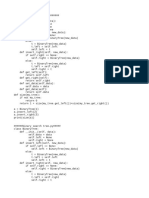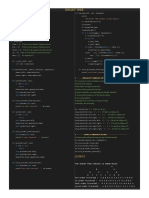0% found this document useful (0 votes)
6 views2 pagesProgramming Project 6.5
The document outlines a programming project to implement binary-search tree functions, including search, insert, and in-order print methods. It provides a base code for a LinkedBinaryTree class with a nested Node class and methods for tree operations. The main section demonstrates inserting values into the tree and searching for specific keys, along with a placeholder for the implementation of the required functions.
Uploaded by
c.am.usp.am.mCopyright
© © All Rights Reserved
We take content rights seriously. If you suspect this is your content, claim it here.
Available Formats
Download as TXT, PDF, TXT or read online on Scribd
0% found this document useful (0 votes)
6 views2 pagesProgramming Project 6.5
The document outlines a programming project to implement binary-search tree functions, including search, insert, and in-order print methods. It provides a base code for a LinkedBinaryTree class with a nested Node class and methods for tree operations. The main section demonstrates inserting values into the tree and searching for specific keys, along with a placeholder for the implementation of the required functions.
Uploaded by
c.am.usp.am.mCopyright
© © All Rights Reserved
We take content rights seriously. If you suspect this is your content, claim it here.
Available Formats
Download as TXT, PDF, TXT or read online on Scribd
/ 2

























































